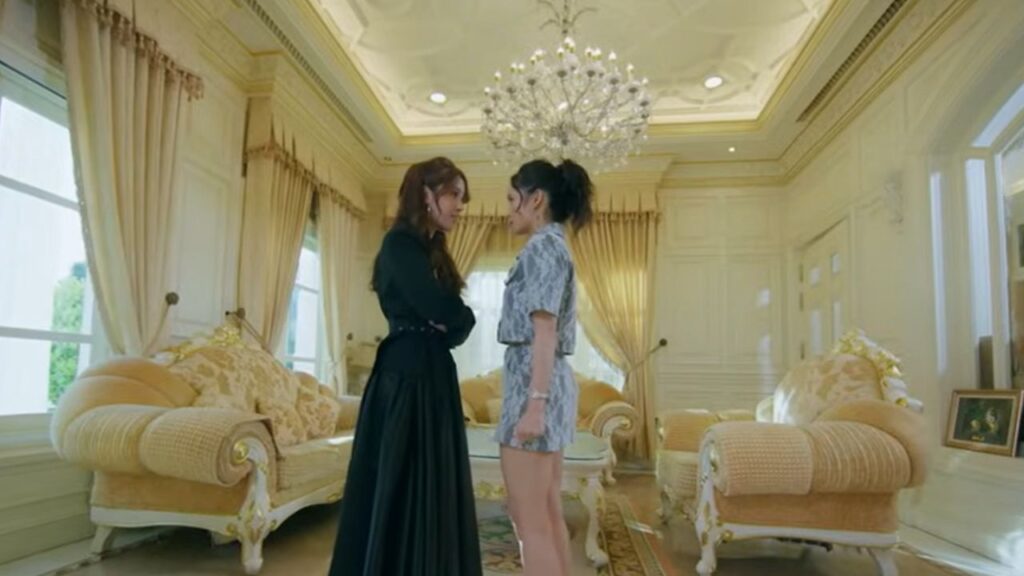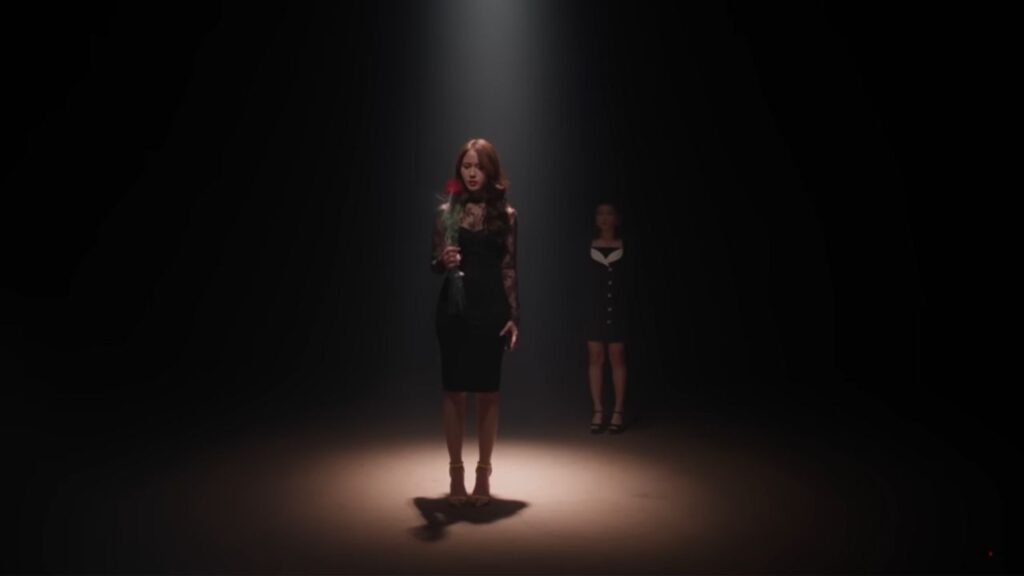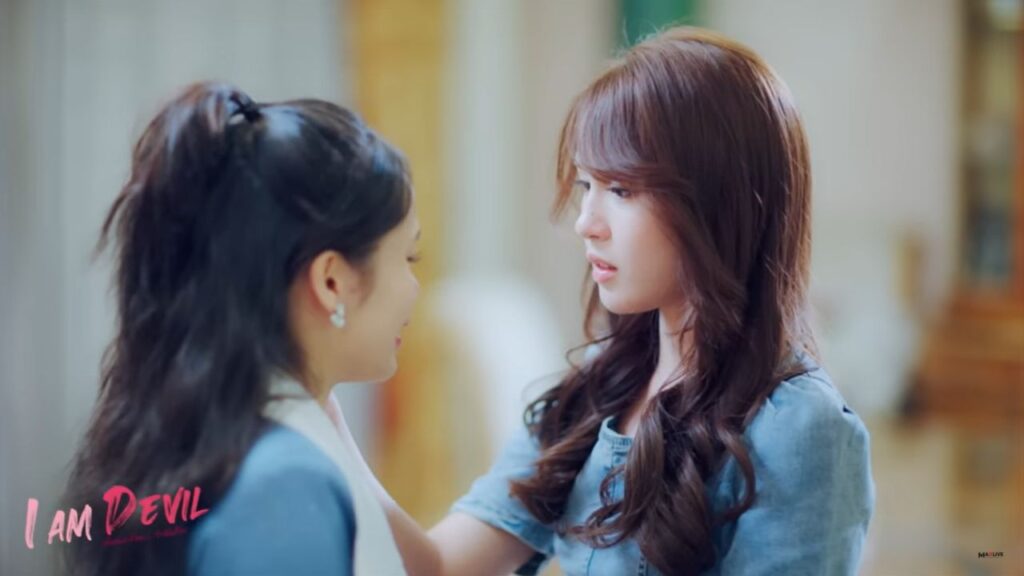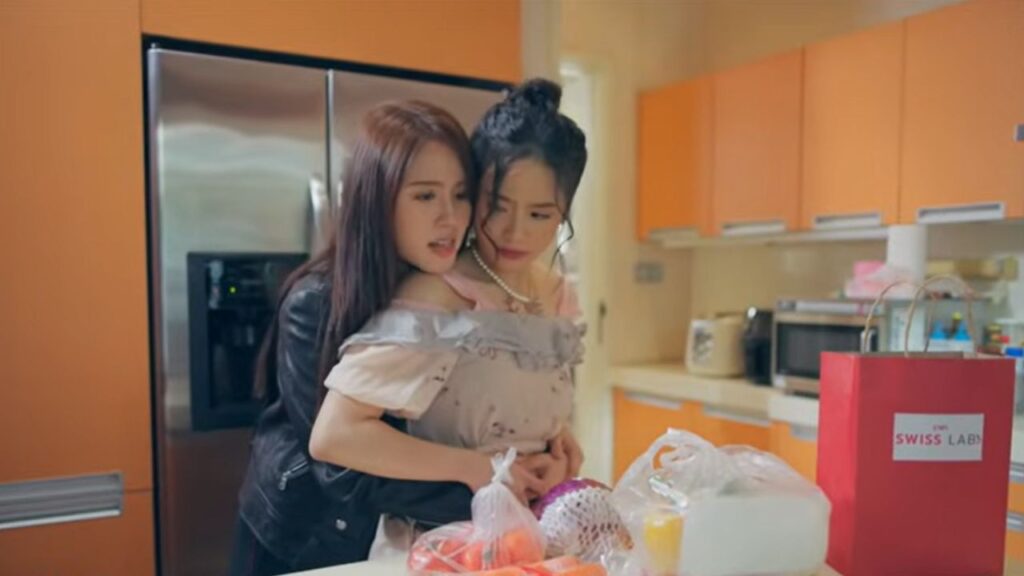I Am Devil is a Thai GL series that embraces chaos with humor and passion, reminding us why unpredictability can feel so addictive.

From the very first episode, I Am Devil Thai GL makes it clear that chaos is not just a mood, it is part of the story itself.
Slaps, arguments, and impulsive decisions fill the screen, yet instead of feeling heavy or cruel, they turn into pure comedy. The sound effects, the exaggerated reactions, and the absurd timing transform these moments into something iconic rather than toxic.
This playful use of chaos gives the series its unique rhythm. Scenes that might be unbearable in another drama become highlights here, almost as if the unpredictability itself is the third lead. The tension is never meant to wound us; it is meant to keep us laughing, shocked, and leaning closer to the screen.
In this way, the series creates an atmosphere where nothing feels safe or predictable. And maybe that is exactly why it works. Because when chaos takes the stage, we realize we are not just watching another GL love story. We are watching a world where madness is part of the charm.

Table of Contents
- Slaps, Sound Effects, and Scenes That Broke Us
- Mook and Prang: From Flirts to Feelings
- Acting, Plot, and Why the Script Works
- Mook Between Red Flags and Green Flags
- Fame, Family, and the Price of Being Watched
- Villains, Threats, and Why the Tragedy Made Sense
- Roses, Quotes, and the Weight of Love
- Should Prang Stay or Walk Away?
- Waiting for Season 2: Growth or More Chaos?
- When Chaos Becomes the Heart of Love
Slaps, Sound Effects, and Scenes That Broke Us
If there is one scene that sums up the absurd charm of I Am Devil Thai GL Series, it is the slap sequence with Mook, Nut, and Nita.
Four slaps in a row, each louder and funnier than the last, became one of the most unforgettable moments of the show. The exaggerated sound effect made it impossible to take seriously, turning what could have been a harsh scene into pure comedy.
What makes it even better is the way the series plays with perspective. While the chaos unfolds in front of us, Prang hides shyly in the corner, trying not to get caught in the mess. That small detail adds another layer of humor, showing us the contrast between her quiet presence and the wild storm that Mook brings everywhere she goes.
Moments like these remind us why the series works. Violence never becomes cruelty here; it becomes spectacle. The slaps are not there to hurt the characters or us. They are there to make us laugh, gasp, and realize that in this story, even conflict can turn iconic.

Mook and Prang: From Flirts to Feelings
At first glance, Mook feels impossible to tame. She flirts with every woman who crosses her path, from casual encounters in pubs to reckless kisses that mean nothing to her. Her chaotic energy paints her as someone who cannot take love seriously.
Yet everything changes when Prang appears. She is not just another crush. She is the one who breaks Mook’s patterns and makes her wonder if love could finally mean something again.
Their chemistry is magnetic because it goes beyond attraction. Both carry emotional wounds from families that never gave them the love they needed. Mook hides her pain under impulsive actions and endless noise, while Prang shields herself with quiet resilience.
This shared absence of family care pushes them closer, not just as lovers but as two people who recognize loneliness in each other.
Together, they create a relationship that is messy, tender, and fragile at the same time. Watching them, we do not just see a couple falling in love. We see two broken hearts trying to build a home in one another, even if chaos threatens to tear it apart at every turn.

Acting, Plot, and Why the Script Works
One of the reasons I Am Devil Thai GL stands out is the way it balances comedy, chaos, and emotion without ever losing its thread. The storyline feels wild on the surface, yet underneath, there is a structure that makes it work.
The writing never lets the madness become empty noise. Instead, every slap, every argument, and every impulsive kiss ties back to the emotional tension between the characters.
The acting amplifies this effect. Mook brings unpredictability with sharp energy, while Prang grounds the story with her quiet but powerful presence. Their chemistry keeps the series alive, but the supporting cast also contributes, giving depth to the conflicts and humor. Nothing feels like a random add-on.
This cohesion is what makes the series convincing. Even with its chaotic tone, the relationships feel real and the emotions ring true. The script manages to make us laugh at exaggerated scenes while still leaving room for reflection on love, family, and personal wounds.
In the end, it proves that good writing does not need to choose between comedy and emotional weight. It can carry both, and that is why the series leaves such a strong impression.

Mook Between Red Flags and Green Flags
Mook is one of those characters who refuses to fit into a single box. At times, she radiates warmth, care, and charm that feel like a green flag. In other moments, her impulsiveness and disregard for boundaries make her lean into the red. This duality keeps us on edge, wondering if she will comfort or frustrate the people around her.
Her tendency to avoid explanations with the motto “kiss first, clear later” says everything about her chaotic approach to love. Instead of solving conflicts with honesty, she often escapes through impulsive intimacy. It is thrilling to watch but also unsettling, because it blurs the line between passion and avoidance.
This contradiction is not a flaw in the writing. It is the essence of Mook’s growth. She is not ready for love in the way Prang deserves, yet she cannot help but crave connection. Her chaos is both her shield and her downfall.
Through her, the series asks us to reflect: do we excuse red flags because of the green ones? Or do we hold out for something healthier, even when chemistry tempts us to stay?

Fame, Family, and the Price of Being Watched
Fame often comes with vanity, but Mook is written differently. As an actress, she does not spend her energy chasing approval or worrying about haters online. Instead, her heart stays with her family, especially her grandmother, who is sick and remains her main priority.
This choice makes her stand out from the usual portrayals of celebrities in Thai GL dramas. It reminds us that being admired by strangers matters far less than caring for those who love us unconditionally.
The series also touches on the weight of social expectations. Through arranged marriage plots, it highlights how both women and men suffer when families dictate choices about love. By showing characters trapped in these structures, the story critiques how outdated traditions still interfere with personal freedom.
In the middle of chaos and comedy, these themes carry surprising depth. Mook’s refusal to bend to public judgment and her commitment to family underline the message that identity and love should never be sacrificed for reputation or social pressure.
It is a sharp reminder that behind the humor, I Am Devil Thai GL Series also delivers reflection on what it truly means to be free.

Villains, Threats, and Why the Tragedy Made Sense
Unlike many Thai GL dramas where the accident trope feels forced, in I Am Devil Thai GL Series it carried real weight. From the beginning, the villain’s presence grew steadily, escalating from strange gifts to threatening photos and videos. Each step raised the tension, showing us that something darker was coming.
When the accident finally happened, it did not feel like a random twist dropped in to create cheap drama. It was the logical outcome of the villain’s actions, a natural escalation that gave the story urgency. For once, tragedy felt justified rather than recycled.
Even the arrival of the police, often absent in similar series, added credibility here. After all the chaos of slaps and impulsive choices, authority finally stepped in when things became too dangerous to ignore. This shift grounded the story, reminding us that consequences always arrive, even in a world where madness often feels like the rule.
The mix of absurd comedy and justified tragedy proves why this series is a wildcard. It knows how to push limits without completely losing its anchor in reality.

Roses, Quotes, and the Weight of Love
“Someone once told me that roses are like being in love, so currently I don’t like roses, because I don’t want being in love.” Mook’s words carry more weight than they seem at first glance.
Behind the humor and chaos, there is a deep fear of vulnerability. Her rejection of roses is really a rejection of intimacy, of the possibility of being hurt again after a painful breakup marked by homophobia and rejection.
This line captures her struggle perfectly. Mook is bold enough to kiss strangers in a pub, yet hesitant to fully open her heart to the one person who makes her feel safe. She hides behind impulsive choices because letting herself be vulnerable feels far more dangerous than chaos ever could.
Prang’s presence, however, shifts that balance. She sees through Mook’s defenses and chooses to stay, even knowing Mook is not ready for love. Her patience becomes both strength and risk. It shows emotional maturity, but it also raises the question: how long can someone carry the weight of another’s fears without losing themselves?
The rose quote becomes a symbol of the central conflict in their relationship. It is not just about falling in love. It is about daring to trust again when love has already left scars. And in that struggle, we find the fragile beauty that makes their story worth watching.

Should Prang Stay or Walk Away?
Prang often feels like the anchor of this relationship. She is calm, patient, and emotionally mature in ways that highlight the contrast with Mook’s chaos. Her willingness to stay by Mook’s side, even when Mook is not ready for love, shows a level of care that feels both admirable and risky.
The question is whether this kind of loyalty can truly sustain a relationship. Patience is valuable, but when it becomes an excuse for tolerating disrespect or instability, it crosses into dangerous territory. Romanticizing chaos or red flags can turn passion into exhaustion.
This is where the series quietly pushes us to reflect. How do we draw the line between love and self-preservation? When does waiting for someone to grow stop being supportive and start being harmful? Mook and Prang’s dynamic invites us to ask ourselves whether love is enough without mutual respect and boundaries.
Prang’s choice to stay feels tender, but it also feels like a warning. It reminds us that love should never mean losing ourselves in someone else’s storm.

Waiting for Season 2: Growth or More Chaos?
With Season 2 already confirmed, the biggest question is whether Mook and Prang will finally grow or if the chaos will only intensify.
The first season gave us passion, unpredictability, and humor, but it also left us with unresolved wounds in both characters. Mook hides behind impulsive choices, while Prang risks losing herself by staying patient for too long.
A second season could be the chance to expand their personalities beyond what we already know. Will Mook confront her fear of love instead of masking it with distractions?
Will Prang learn how to set boundaries and protect her own emotional space? Growth for both of them, individually and together, would give their story a new depth that Season 1 only touched on.
Of course, the wildcard nature of I Am Devil Thai GL Series makes it impossible to predict. Maybe we will see healing and progress, or maybe the writers will double down on the chaos that made the show so addictive in the first place.
Either way, Season 2 feels less like a continuation and more like a test. Can these two survive not just as a couple, but as people who truly learn to grow?

When Chaos Becomes the Heart of Love
I Am Devil Thai GL Series is messy, loud, and at times contradictory, but that is exactly what makes it stand out. It is not afraid to lean into chaos, to mix comedy with drama, and to give us characters who feel both frustrating and unforgettable.
Beneath the slaps and laughter, it dares to explore love, fear, and the ways people cling to each other when family fails them.
That blend of unpredictability and honesty is why the series deserves attention. It is not polished or perfect, but it carries a wild charm that makes it impossible to ignore.
Now the question is yours: what did you think of the chaos? Would you stay with someone like Mook, or walk away like Prang could?

Featured image: Promotional still courtesy of Maxlive TV.



